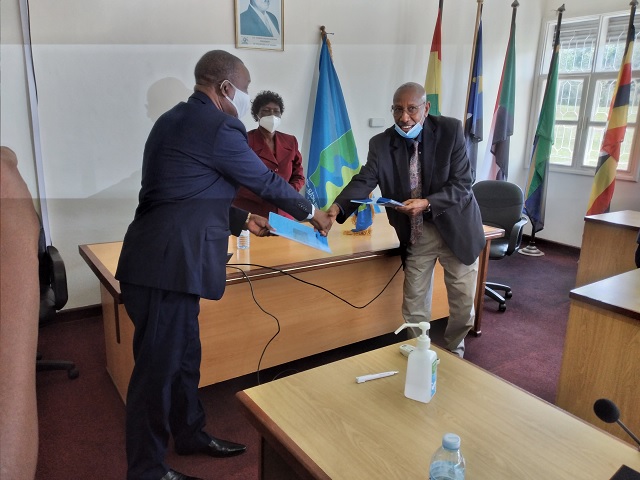
Kampala, Uganda | Ronald Musoke | Eng. Sylvester Anthony Matemu of Tanzania has begun his two-year rotational role as the head of the Nile Basin Initiative. He takes over from Prof. Seifeldin Hamad Abdalla of Sudan.
The Nile Basin Initiative whose headquarters are in Entebbe, Uganda, is a regional inter-governmental partnership that brings together ten countries that are within the Nile Basin. These states include; Burundi, the Democratic Republic of Congo, Egypt, Ethiopia, Kenya, Rwanda, South Sudan, Sudan, Tanzania and Uganda. Eritrea is an observer country.
The handover event which took place on Aug.18 was witnessed by Dr. Florence Adongo, the head of the Directorate of Water Resources Management in Uganda’s Ministry of Water and Environment.
Eng. Matemu who has vast experience in transboundary water management brings to the Nile Basin Initiative Secretariat over 38 years of experience of which he has served in different capacities including heading various Technical Advisory Committees at national, regional and international levels. He has also served as Minister responsible for water, higher education, communication, science and technology.
The handover ceremony was marked by Eng. Matemu and Prof. Seifeldin signing a handover report. Speaking shortly after the handover ceremony, Matemu thanked Uganda for “the warm welcome he received upon his arrival.” He also thanked his home government for trusting him with the new role. Matemu called upon his staff and development partners to remain committed and supportive to the Nile Basin Initiative.
“We need to work hard in order to meet the expectations of all the people in the 10 member countries of the Nile Basin,” he said, “The 272 million people are not ready to accept our excuses of how we failed to meet their expectations. I solicit your support and commitment.”
“If I fail, it means that we will all have failed and if I win, it will mean that we have all won. To deal with sovereign states is not an easy job but with good teamwork and spirit to work together, we will succeed.”
Prof. Seifeldin, the outgoing executive director, congratulated the new boss upon taking the new responsibility. He thanked the secretariat staff for the resilience, dedication, teamwork and support they have given him over the last two years.
He also thanked the government of Uganda for the support given to him throughout his tenure. He also appreciated friends of the Nile and Development partners for their continued support to the cooperation within the Nile Basin.
Dr. Adongo thanked Prof. Seifeldin, the outgoing executive director, for “his his great contribution he has made towards changing the face of the NBI despite the challenges of COVID-19 that plagued his term.
“He has been very easy to work with and he has in most cases always consulted TAC in any action that he has wanted to take forward,” she said, adding that Prof. Seifeldin had managed to bring the different countries together. “That is something we cannot take for granted,” she said.
To the new executive director, she promised him total support, adding that “her door would be open for him to consult.”
Dr. Malte Grossmann, the Head of Projects at GIZ, which provides support to transboundary cooperation in the Nile Basin also thanked Prof. Seifeldin for his leadership at NBI and also congratulated Eng. Matemu upon his new role. He pledged continued support for NBI’s programme work in enhancing cooperation on the Nile.
The Nile Basin Initiative was launched in 1999 to manage and develop the shared Nile Basin water and related resources in a cooperative manner as well as share the substantial socio-economic benefits and promote regional peace and security.
A regional secretariat (Nile-Sec) is based in the Ugandan lakeside town of Entebbe and it is the executive arm responsible for the overall corporate direction of the initiative while there are two subsidiary action programmes—the Eastern Nile Action Programme (ENSAP) and the Nile Equatorial Lakes Subsidiary Action Programme. These two arms are responsible for preparing transboundary investment projects aimed at contributing to energy, food and water security in the Nile Basin.
 The Independent Uganda: You get the Truth we Pay the Price
The Independent Uganda: You get the Truth we Pay the Price





